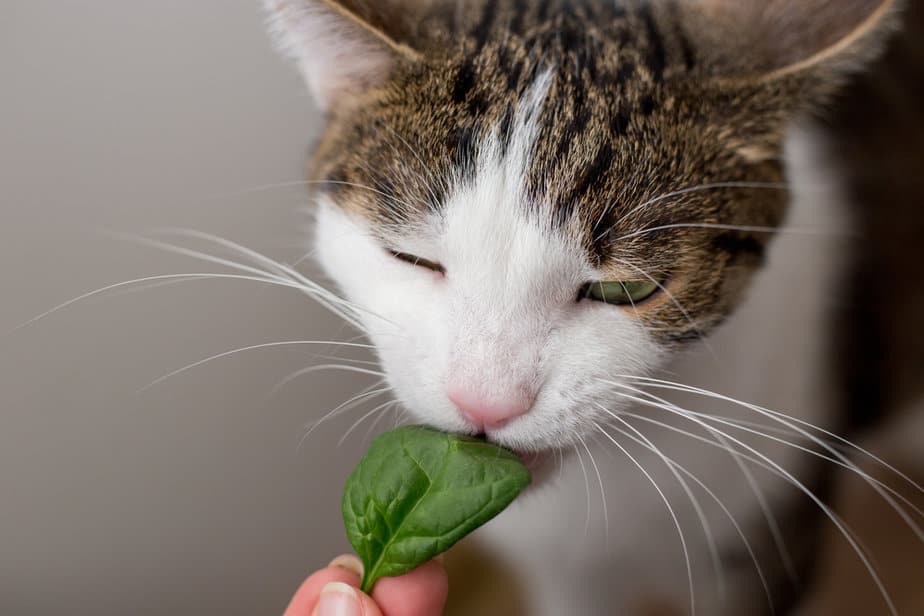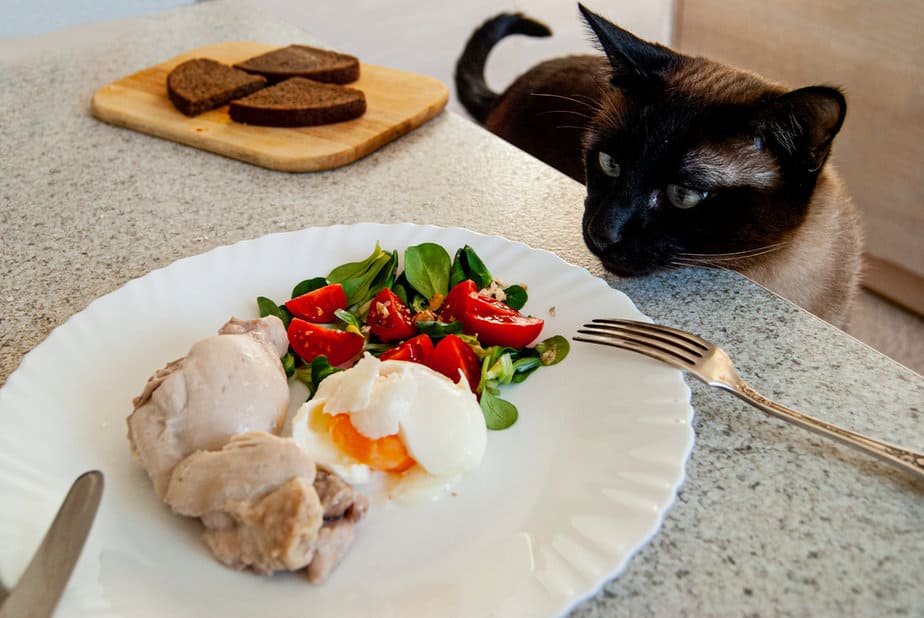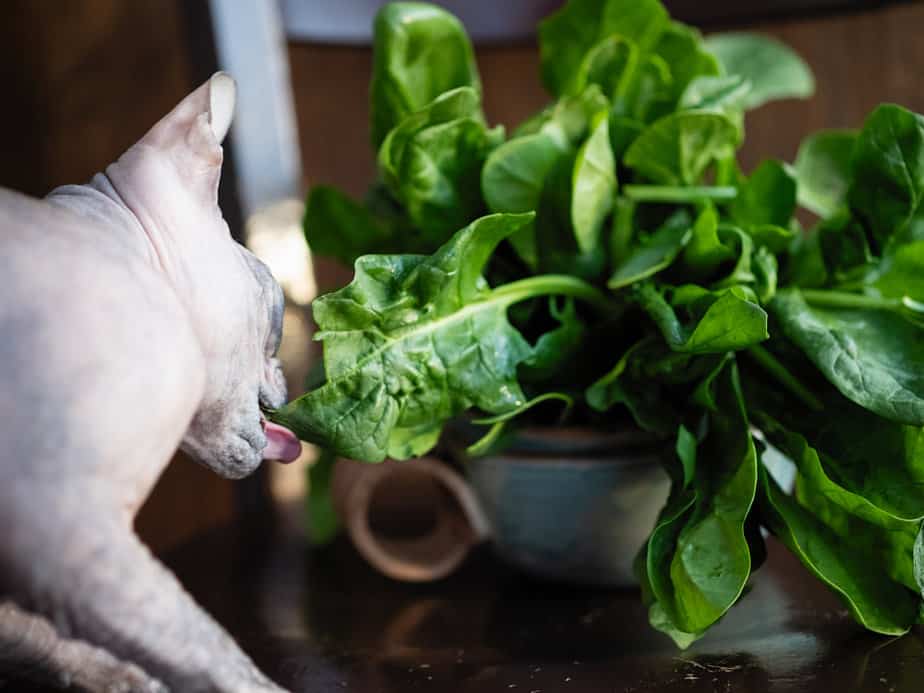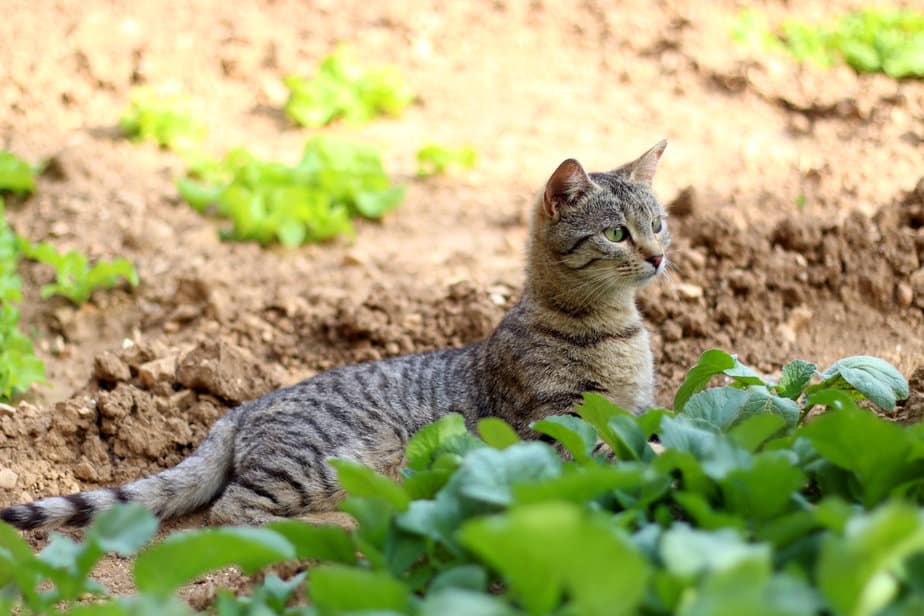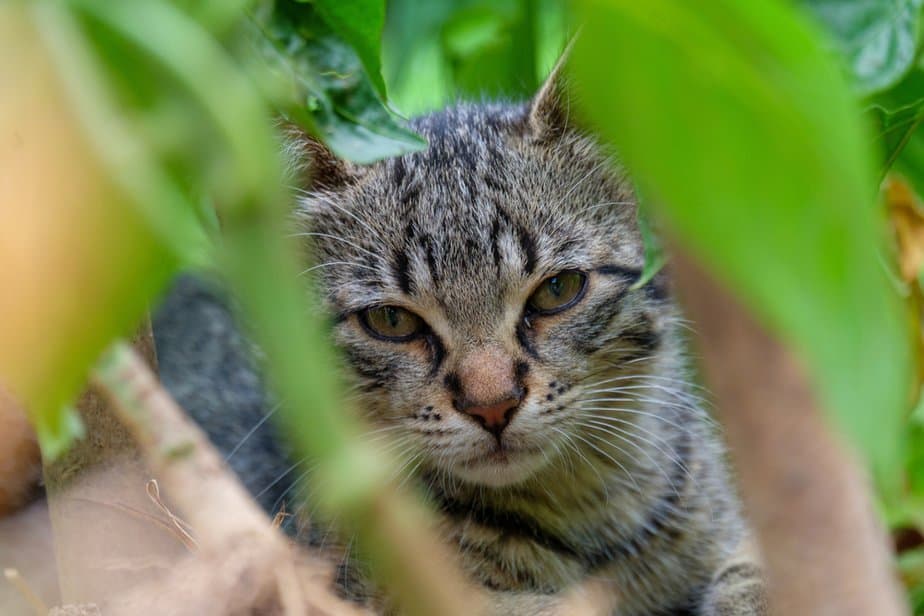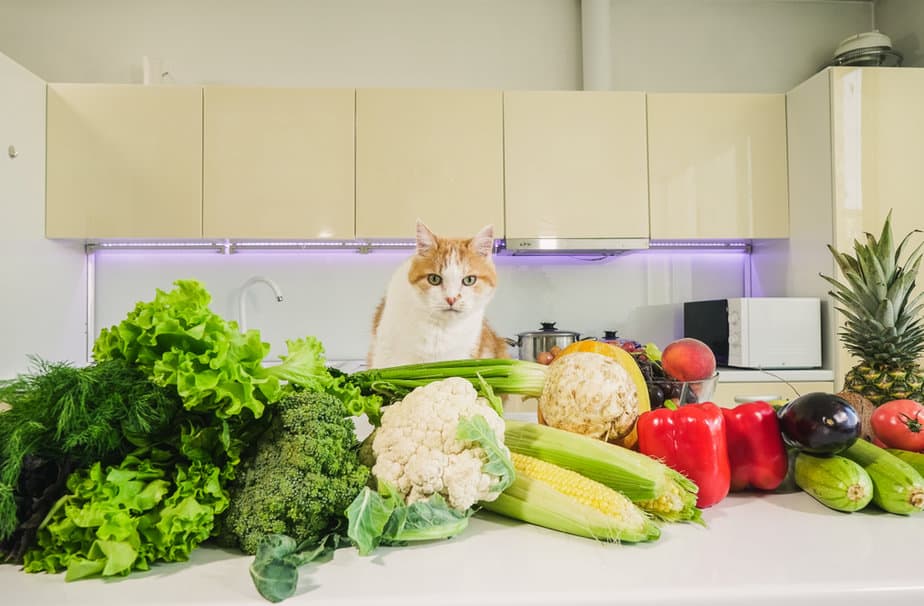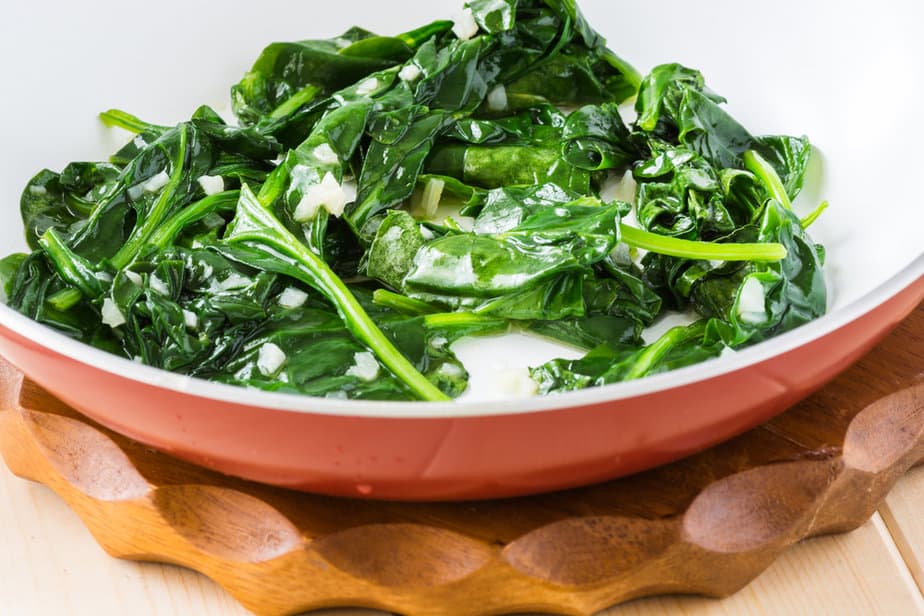📖 Table of Content:
You can barely open the Foodie magazine or the Good Food (or pretty much any other food magazine) without having to buy spinach for every single recipe. And, let’s be honest, you’re on a trying out new recipes kick these days and there’s nobody to try them (except for your cat, of course). But, can cats eat spinach?
Your cat hasn’t been showing much interest in anything other than her regular cat food and cat treats. But, you can’t help but notice she’s been complaining (meowing, scratching, and tapping her paws) lately.
She’s been trying to get her paws on pretty much anything you’ve been cooking up in the kitchen. She’s been trying to sniff, lick and bite into your Caprese bruschetta, creamy mushroom risotto, and spinach gratin. And let’s be honest, you can’t really stop her from scoffing down the entire thing.
According to our friends over at the ASPCA (American Society for the Prevention of Cruelty to Animals), you have nothing to worry about. Cats can (and should) eat spinach as this leafy green contains a bunch of nutritional and health benefits.
Don’t believe us? Throw a quick glance at the back of your cat’s regular cat food. There’s a pretty good chance you’ll find spinach listed as one of the main ingredients. There’s no surprise there when you know that spinach happens to be one of the few veggies (salads, plants, leafy greens!?) that are safe for cats.
What’s spinach?
Spinacia oleracea (no, this isn’t the title of the new Harry Potter movie), is a leafy green vegetable otherwise known as spinach.
Spinach originated in Persia but you can find it pretty much everywhere in the world. You can find it fresh, frozen, or canned. And you can eat it cooked or raw depending on your mood.
Spinach is packed with fiber, vitamins, minerals, and antioxidants. You can count on getting your daily dose of vitamin C, vitamin A, vitamin, K, iron, folate, and potassium from a single serving size of spinach. And, let’s not forget about the amazing health benefits spinach brings to your table.
Relief of oxidative stress, prevention of cancer, improvement of blood pressure levels, and conservation of eye health are only some of the health benefits you can count on… as a human.
Do cats have the same benefits from spinach as humans do? Can cats eat spinach the same way humans do? Can cats eat spinach as a regular part of their diet? Here’s everything you need to know about cats, spinach, and their ever-so-complicated relationship.
So, can cats eat spinach?
Your curious creature found your secret spinach stash and scoffed down every single leaf? You have nothing to worry about because cats can eat spinach. Even our friends over at the APSCA have nothing negative to say about this leafy green.
Hold your horses (or better yet, hold your cats), because you might not want to run off to the nearest Trader Joe’s to get a pack of spinach right away. While spinach shouldn’t cause adverse reactions to your cat, that doesn’t mean you should include it in your cat’s regular diet.
You see, cats are obligate carnivores. They require heaps of meat, animal protein, and animal-sourced nutrients in their diet to survive. They don’t require fruits, veggies, and grains the same way humans do.
Actually, their digestive systems don’t possess the enzymes necessary to break down most foods humans eat regularly. Do you want to surprise your furry friend with a warm cup of milk? Cats are lactose intolerant! You want to give her a bite of your chocolate chip cupcake? Cats are allergic to chocolate!
You get the picture, right? Cats can eat spinach but that doesn’t mean that they should (at least not all the time). Your cat’s much better off munching on Trader Joe’s Turkey and Giblets Dinner than getting a tummy ache from an overpriced packet of spinach ($2.29, really?!).
What’s good about spinach?
How about everything?! There’s a reason why every single recipe you stumble upon in a food magazine (or even on TikTok) asks for at least a handful of spinach. Such a minuscule amount of spinach contains pretty much every vitamin, mineral, or antioxidant your body needs.
And yes, the same applies to your furry friend! A couple of spinach leaves here and there can provide your cat with an array of nutritional and health benefits. And, you should take a look at some of them before you make your decision regarding the role you want this leafy green to play in your cat’s life.
1. Vitamins
Yes, yes, and yes! Spinach is beaming with vitamins that can make your cat’s life better, healthier, and happier. Your cat should get most of her nutrients from other animals, but there’s no shame in looking for a bit of somethin’-somethin’ from a different source.
Let’s talk vitamins! Spinach contains a bunch of vitamin C, vitamin A, and vitamin K which might seem like you’re reading the back of the most organic, cold-pressed orange juice. And you’re actually reading about the never-ending nutritional benefits your furry friend can get from a mere handful of spinach.
You’re not convinced, yet?
Vitamin C happens to be an essential vitamin for cats that typically gets synthesized in your cat’s liver. But, your cat might be experiencing health problems that are preventing her from producing her own vitamin C. Oranges are out of the question (obviously), and that’s where spinach steps in.
Vitamin A comes at a close second place (still essential, though) and helps your cat maintain healthy eyesight, skin, and coat. Vitamin A happens to be one of those vitamins you need when you’re trying to make your cat star in the upcoming Rapunzel live-action remake.
Last but not least, vitamin K helps your cat maintain a healthy liver. Let’s just say that (on the off chance that she’s reading this article with you) your cat’s attempts to snatch every last leaf of spinach are accounted for.
2. Minerals
Yes, cats can eat spinach! But, more importantly, cats should eat spinach because these leafy greens are beaming with minerals that can influence your cat’s health most positively. Calcium, iron, manganese, zinc, and magnesium are only some of them.
These minerals are great for your cat’s nerve, muscle, and thyroid function. They’re also great for maintaining the health of your cat’s skin (Bella Hadid, who?) and hair (again, Bella Hadid, who?!). With that (pretty lame) joke aside, we can agree that spinach brings a lot to your and your cat’s table.
3. Fiber
And we can’t forget about fiber! Fiber happens to be one of the most important things your cat can get from plants. Wild cats get fiber from the stomachs of other animals and from munching on wild plants and leaves while they’re chasing the sun.
But, Mrs. McFluffer doesn’t do any of that. She spends her days purring, posing for the latest cover of Vogue (or at least that’s what she looks like she’s doing), and waiting for you to bring her breakfast to bed. That’s where spinach comes to play!
She can’t afford to have digestive problems while she’s working her little under-the-tail area to pay the bills (yes, she’s still working on that Vogue cover). Spinach contains a bunch of fiber, and fiber does wonders for her digestive system.
You see, fiber provides bulk to help food move through her digestive tract. Fiber also retains water within her digestive tract which, in turn, helps with constipation and diarrhea.
While that might not be the most glamorous conversation to have with your precious purrincess, she should be delighted to reap the spinach benefits.
What’s bad about spinach?
“Too much of anything could make you sick”, as someone once said. While spinach does seem like one of the best leafy greens your cat can get her paws on, there are some downsides to consuming too much spinach on a regular.
Nobody wants to see their furry friend rushing to her litterbox because of something green, right? Let’s be honest, your cat wouldn’t even mind spending the rest of the day switching between diarrhea and vomiting after eating a paw-licking steak. But, spinach?!
1. Spinach isn’t a natural part of a cat’s diet
We’ve talked about this, right? Cats are carnivores which means they thrive on meat, animal protein, and animal-sourced nutrients. They’re the happiest (and healthiest) when they’re munching on carefully crafted cat food, cat kibble, and cat treats.
They’re pretty happy when they’re enjoying an occasional bite of chicken, turkey, beef, and fish, too. But, they don’t seem like they’re enjoying themselves that much when they’re chewing on leafy greens such as spinach.
Sure, they break into your garden, turn every vegetable upside down (even turnip, seriously?), and scoff down every spinach leaf they can get their paws on.
But, they’re only doing that because they’re curious and want to check what the fuss seems to be about. And because they’re rude, but that’s beside the point.
So, cats can eat spinach but spinach shouldn’t be a regular part of their diet. They can have a couple of leaves with their regular cat food, munch on a handful in between the meals, or nibble on homemade spinach (cat-friendly) cookies. But, that’s pretty much enough.
2. Spinach can cause harm to cats with urinary problems
And right when we thought spinach couldn’t do anything wrong! Unfortunately, what you’re reading happens to be completely true because of something known as calcium oxalate. Calcium oxalate leads to the development of kidney stones and urinary tract stones.
These stones are difficult to remove (surgically or non-surgically) and they can cause a bunch of other health complications and detrimental diseases. And, you guessed it, spinach contains quite high levels of calcium oxalate.
Sure, your furry friend would have to devour A LOT of spinach to experience any of these repercussions. But, it’s always better to stay on the safe side and munch on something that doesn’t resemble a green monster.
Cats that are already dealing with kidney and urinary tract problems shouldn’t even catch a whiff of spinach (our way of saying “don’t let your unhealthy cat eat spinach!”). Other than that, your cat shouldn’t experience adverse reactions from a couple of leaves here and there.
Can cats eat raw spinach?
Yes, they can! Raw spinach might even be better for your furry friend than the cooked one. raw spinach contains more vitamins and minerals because the cooking process typically destroys some of them. Chewing on raw spinach in between her meals might be a great choice for your cat!
But… There’s always a but when it comes to feeding raw foods to your cat. Raw foods tend to contain a bunch of bacteria and parasites that can harm your cat’s health.
Wild cats are pretty much used to munching on whatever they aren’t supposed to munch on. But, your precious purrincess might not feel the same way when she eats a bunch of pesticides with her spinach.
Cooking does seem to solve this problem, so you might want to make that decision on your own. Consult with your vet, check whether your cat’s stomach has the guts (no pun intended) to break down those pesky passengers, and you’re good to go.
Can cats eat cooked spinach?
Yes, cats can eat cooked spinach! You might be thinking to yourself “the cooking process destroys everything good about spinach”, but that’s not entirely true. Spinach does lose some of the benefits through the cooking process, but there’s plenty left for your cat to reap.
Remember, cook the spinach without the butter, salt, seasonings, and other harmful ingredients to ensure your cat’s safety. Butter and salt might cause your cat to gain weight, become obese, or even develop diabetes.
Seasonings such as garlic powder and onion powder can even rush your cat to the emergency animal clinic (these two combined can even lead to a fatal outcome!). So, when you’re planning on sharing your creamy spinach risotto with your furry friend, make sure to forget everything you know about cooking.
Can cats eat spinach leaves?
Yes, they can! Actually, cats can eat pretty much every part of the spinach plant. Spinach doesn’t contain anything that might harm your cat in the long run, and spinach leaves aren’t an exception.
On the other hand, spinach leaves do contain the highest levels of calcium oxalate. That means that you should avoid feeding spinach leaves to your cat when she’s dealing with kidney disease, urinary tract disease, or any other related health problems.
Other than that, feel free to add a handful of spinach leaves to your cat’s favorite Tender Tuna or Fancy Feast. Trust me, she will absolutely adore having some variety in her (otherwise boring) dinners.
And, can cats eat other leafy greens?
That’s another yes! Cats might not need veggies and leafy greens as a regular part of their diet, but they can certainly benefit from them now and then. Vitamin, minerals, and antioxidants tenure your cat’s health the same way protein, amino acids, and fatty acids do.
But, it’s also important to emphasize that certain veggies and leafy greens aren’t safe for your furry friend. That’s why it’s incredibly important to consult with your vet before adding anything out of the ordinary to your cat’s diet. And yes, that includes spinach, too.
Other than that, feel free to choose between some of these veggies when you’re preparing a homemade meal for your cat. Broccoli, carrots, kale, collard greens, and bok choy make for a paw-licking stew) or even a salad). Peas, corn, squash, green beans, and zucchini don’t fall behind.
On the other hand, avoid veggies such as onion, garlic, leeks, scallion, shallots, and chives because they’re toxic to cats (according to our friends over at the ASPCA). Mushrooms, eggplant, avocado, and rhubarb shouldn’t make the groceries list, either.
What’s the final verdict? Can cats eat spinach?
Yes, cats can eat spinach! Feel free to add a couple of spinach leaves to your cat’s favorite food or make a homemade spinach supper as a great pick-me-up after a long day of meowing and purring.

